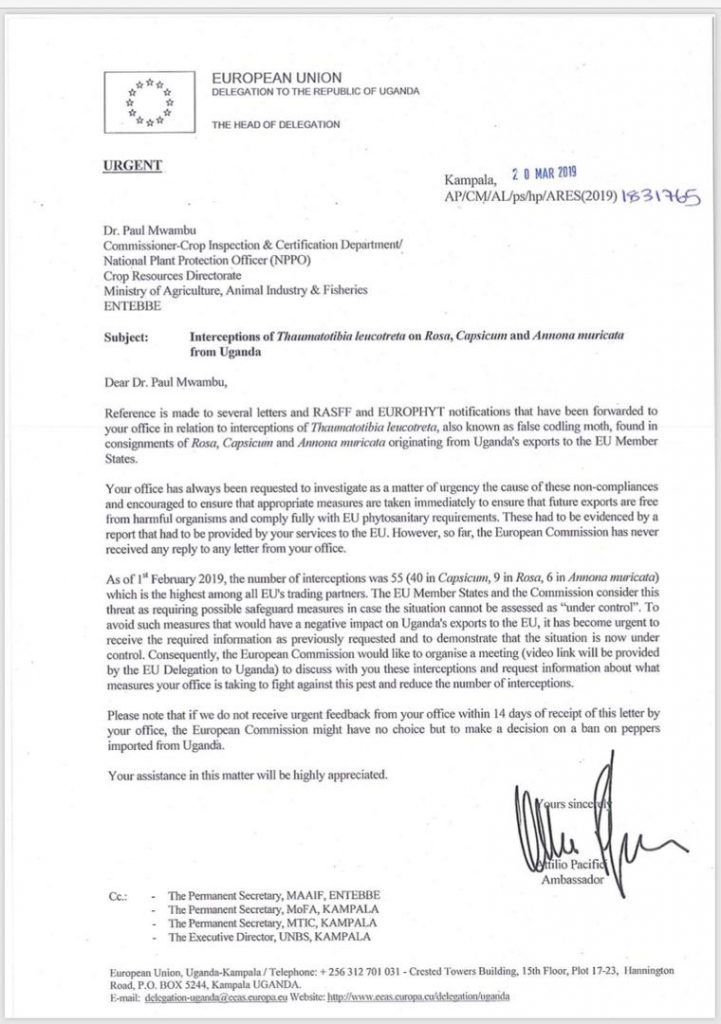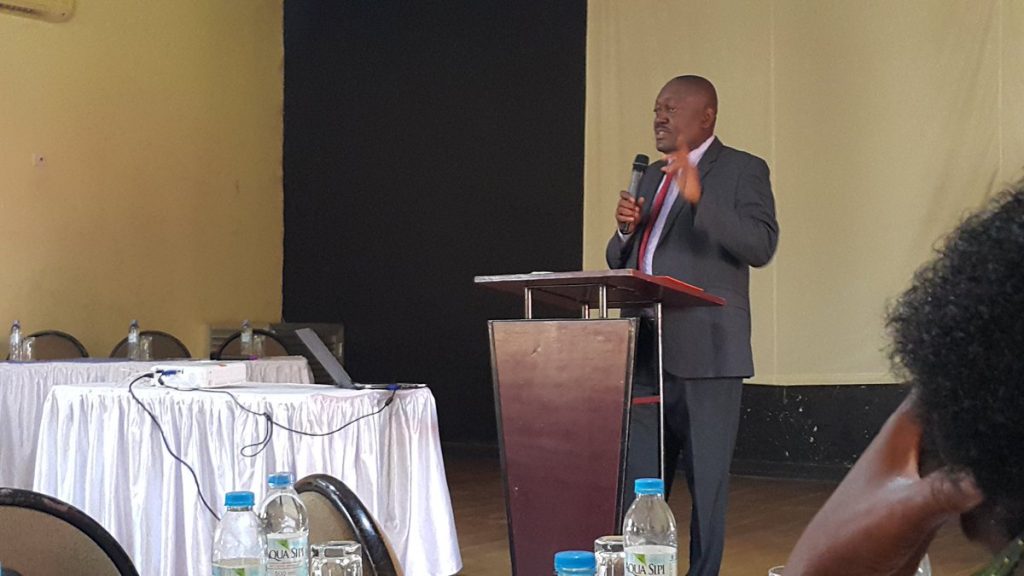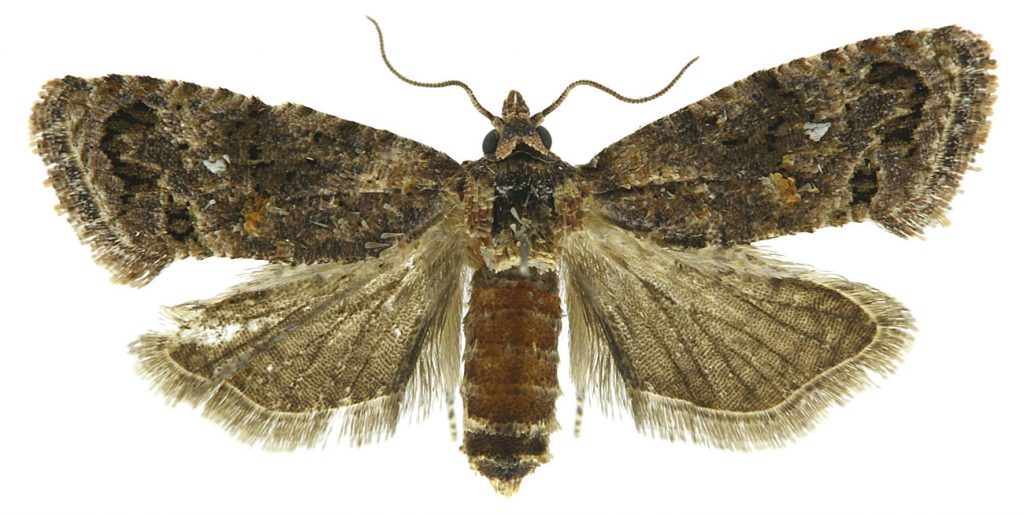
The European Union on 20th March 2019, threatened to ban all pepper imports from Uganda, unless Uganda’s Ministry of Agriculture demonstrated that they had taken sufficient measures to bring “under control” multiple pest infestations found on a number of Ugandan export consignments of rose flowers, peppers and soursop.
The threat was contained in a strongly worded letter that the European Union Delegation in Uganda Ambassador, H.E Attilio Pacifici wrote to a Mr Paul Mwambu, the Commissioner-Crop Inspection & Certification Department National Plant Protection Officer (NPPO) at the Crop Resources Directorate in the Ministry of Agriculture Animal Industry & Fisheries (MAAIF).
The directorate inspects and issues phytosanitary certificates to all Ugandan agricultural exports. A phytosanitary certificate is a document (certificate) that certifies that plant and plant products contained in a given shipment are free from regulated pests, and conforms with other phytosanitary (plant health) requirements as specified from the importing country.

“Reference is made to several letters and RASFF and EUROPHYT notifications that have been forwarded to your office in relation to interceptions of Thaummatibia leucotreta also known as false codling moth, found in consignments of Rosa (roses), Capsicum (peppers) and Annona muricata (soursop) originating from Uganda’s exports to the EU Member States,” wrote Ambassador Pacifici.
“Your office has always been requested to investigate as a matter of urgency the cause of these non-compliances and encouraged to ensure that appropriate measures are taken immediately to ensure that future exports are free from harmful organisms and comply fully with EU phytosanitary requirements. These had to be evidenced by a report that had to be provided by your services to the EU. However, so far, the European Commission has never received any reply to any letter from your office,” further wrote the ambassador.
According to the European Commission Website, EUROPHYT (European Phytosanitary) is a notification and rapid alert system dealing with interceptions for plant health reasons of consignments of plants and plant products imported into the EU or being traded within the EU itself. EUROPHYT is established and run by the Directorate General for Health and Consumers of the European Commission.
RASFF is the Rapid Alert System for Food and Feed- a European Commission tool to ensure the flow of information to enabling swift reaction when risks to public health are detected in the food chain
In the letter titled: “Interceptions of Thaummatibia leucotreta on Rosa, Capsicum and Annona muricata from Uganda” ambassador Pacifici said that as 1st February 2019, the number of non-compliant interceptions by EUROPHYT was 55 (40 in Capsicum, 9 in Rosa, 6 in Annona muricata) – which is the highest among all EU trading partners.
“The EU Member States and the Commission consider this threat as requiring possible safeguard measures in case the situation cannot be assessed as under control. To avoid such measures that would have a negative impact on Uganda’s exports to the EU, it has become urgent to receive the required information as previously requested and to demonstrate that the situation is now under control,” warned the ambassador.
He called for a video link meeting with the Agriculture ministry to discuss “these interceptions and request information about what measures your office is taking to fight against this pest and reduce the number of interceptions.”
“Please note that if we do not receive urgent feedback from your office within 14 days of receipt of this letter by your office, the European Commission might have no choice but to make a decision on a ban on peppers imported from Uganda,” concluded Ambassador Pacifici.
The letter was copied to the Permanent Secretary MAAIF as well as the Foreign Affairs and Ministry of Trade, Industry & Cooperatives. The Executive Director, Uganda National Bureau of Standards (UNBS) was also copied in.
It was not yet clear by press time, if the said meeting has taken place and the way forward. The letter did not also specify the errant Ugandan exporting companies.

The European Union is Uganda’s third biggest source of export revenue, taking in USD542 million worth of Ugandan exports in 2018, after Middle East countries who took in USD600 million in Ugandan exports and COMESA countries (USD1.5 billion.)
Approximately 70% of Ugandan exports are agricultural and are mostly exported in raw or semi-processed form. Uganda’s flower, fruits and vegetable export revenues totalled USD101.51 according to figures from Uganda Bureau of Statistics and Bank of Uganda.
The European in 2013 had banned Ugandan export of pepper, hurting earnings from$1.74m (Shs6.3b) in 2013 to $573,000 earned in 2014. The EU also called for an audit of the phytosanitary controls at Ministry of Agriculture, Animal Industry and Fisheries (MAAIF) at the time.
Government responds
Dr Mwambu is quoted in today’s New Vision, a local daily, saying that government had responded to the EU querries.
“We held a video conference with the EU delegation in Uganda and the EU head office in Brussels, during which we explained the difficulties in controlling the rapid pest,” Mwambu is quoted as saying.

Mwambu also told New Vision that the pest has over 80 plants in which it can thrive, making it difficult to control. He advised farmers to clear the plantation, once the pest had been identified because of the pest’s complex predatory habits.
He also said that government of Uganda had secured a $700,000 facility from the Netherlands’ government to implement the Trade Development Facility project, part of which will be used to fight the pest.
Trade Minister, Hon Amelia Kyambadde, is also quoted by The New Vision, saying that a joint technical team composed of experts from her ministry, MAAIF, Uganda Export Promotion Board, UNBS, Internal Security Organization, Civil Aviation Authority, Uganda Revenue Authority and district agricultural officers had been composed to fight the pest.


 Andrew Mashanda Appointed to Lead Business and Commercial Banking Across Africa and Offshore for Standard Bank Group
Andrew Mashanda Appointed to Lead Business and Commercial Banking Across Africa and Offshore for Standard Bank Group